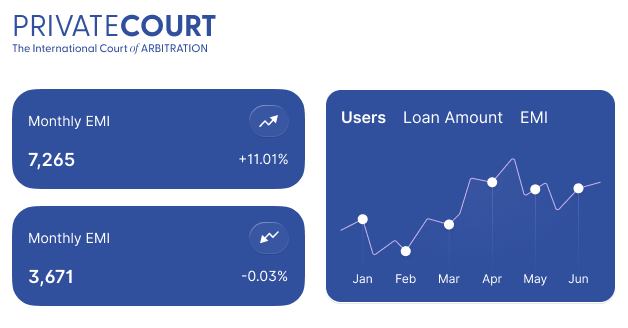In today’s fast-paced business environment, disputes are inevitable—but disorganisation is not. For financial institutions, MSMEs, professionals, and even individual users, initiating a dispute resolution process is only the beginning. The real challenge lies in tracking its progress, understanding where it stands, and taking the right steps at the right time. Without timely information, even well-prepared parties can face delays, missed opportunities, and legal fatigue.
PrivateCourt, as a neutral facilitation platform for ADR methods like arbitration and conciliation, addresses this issue with a robust dashboard that empowers its members to manage and monitor their dispute cases effectively. This dashboard is more than a case log—it’s a data-driven control centre designed to deliver clarity, convenience, and actionable insight across the resolution journey.
A Unified View: All Your Disputes in One Place
Whether you're an NBFC handling recovery-related cases or an entrepreneur resolving client contract disputes, the ability to view all matters in one space is invaluable. PrivateCourt’s dashboard offers a consolidated screen that displays every case linked to your account—sorted by type, timeline, and resolution stage.
From initiation to closure, each case is documented with clear milestones: date of filing, conciliation attempts, arbitration proceedings, award issuance, and final closure. This streamlines your internal follow-ups and helps legal or operations teams stay aligned without relying on scattered spreadsheets or inconsistent email updates.
Smart Filters That Prioritise What Matters
Volume is not always the problem—visibility is. PrivateCourt’s dashboard is equipped with dynamic filters that let you sort cases by their status (e.g., “Under Review,” “Awarded,” “Closed”), industry sector, counterparties, and dispute type.
For instance, a bank’s legal team can quickly filter all arbitration cases initiated in the current quarter. An MSME can isolate disputes with a particular vendor. These filters cut through the clutter, offering a focused lens on what truly demands your attention—thus improving both productivity and response time.
Visual Status Indicators: Information at a Glance
In high-stakes environments, clarity needs to be instant. The dashboard uses intuitive visual cues—like colour-coded tags and milestone progress bars—to help users quickly identify the status of each case. Green indicates a resolved matter; yellow flags a case in progress, while red signifies stalled or urgent disputes.
This design removes ambiguity. Business owners don’t need to decipher legal jargon, and senior management can grasp overall status without wading through dense reports. Whether preparing for an internal review or making a boardroom presentation, this visual clarity becomes a significant asset.
Scheduled Reports That Keep You Ahead
Beyond real-time tracking, PrivateCourt also delivers weekly or monthly summary reports to users via email. These auto-generated reports include open case counts, resolution timelines, delay patterns, and case category distribution. This means you stay updated even if you don’t log in daily.
For CXOs and decision-makers, these insights can influence resource planning, team allocation, and compliance tracking. A sudden rise in unresolved cases or frequent rejections in conciliation might signal the need for a strategic shift—something you catch early through these scheduled updates.
Performance Insights: Turning Data Into Direction
The dashboard doesn’t just show where your cases are—it reveals how your dispute resolution approach is performing. Built-in performance analytics highlight average resolution timelines, success rates of conciliation versus arbitration, counterparty response behaviour, and common causes of delay.
This data becomes a critical decision-making tool. For example, if your team consistently sees delayed responses during conciliation, you may choose to escalate similar future matters directly to arbitration. If resolution timelines are improving quarter over quarter, your investment in legal training or negotiation workshops is paying off.
Role-Based Access for Team Collaboration
Data security is paramount, especially when multiple stakeholders are involved. PrivateCourt’s dashboard offers role-based access, allowing administrators to define what different users within an organisation can view or edit.
This is especially useful for large teams—legal heads may want a high-level view, while support teams can manage documentation uploads or deadline tracking. By customising access, organisations ensure sensitive case data remains secure while still encouraging efficient collaboration.
Future-Ready: Predictive Analysis and Counterparty Profiling
As part of its roadmap, PrivateCourt is actively working to embed AI-powered predictive analytics and dispute behaviour profiling within the dashboard ecosystem. These tools will transform how users not only monitor but also anticipate outcomes.
Imagine being able to forecast the likelihood of successful conciliation based on counterparty history, or knowing in advance which cases are at risk of delay. Predictive models—trained on years of dispute data—will allow members to plan ahead, allocate resources more effectively, and reduce decision fatigue.
Imagine being able to forecast the likelihood of successful conciliation based on counterparty history, or knowing in advance which cases are at risk of delay. Predictive models—trained on years of dispute data—will allow members to plan ahead, allocate resources more effectively, and reduce decision fatigue.
Additionally, profiling features will provide deeper context about frequently engaged parties—whether they’re cooperative, repetitive defaulters, or resistant to early resolution. This intelligence empowers users to tailor their strategies and avoid repeating past mistakes.
A Smarter Way to Resolve
Disputes may be unpredictable, but managing them doesn’t have to be. With PrivateCourt’s comprehensive dashboard, users gain more than just access to dispute facilitation—they gain the ability to track, analyse, and act with confidence. Whether it’s a single matter or a portfolio of ongoing disputes, the dashboard turns complexity into clarity.
For banks, MSMEs, professionals, and individuals alike, this tool supports a more organised, efficient, and data-literate approach to alternative dispute resolution. As PrivateCourt continues to enhance its platform, features like predictive analytics and profiling will only strengthen the platform’s commitment to neutral, user-first dispute resolution.
keywords:Dispute resolution dashboard , Arbitration analytics , Case tracking tools ,ADR platform India ,Online dispute monitoring ,Performance insights ADR , Predictive dispute analysis

